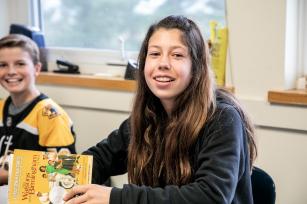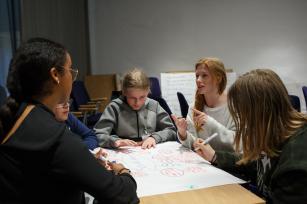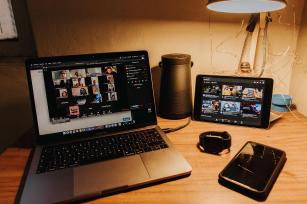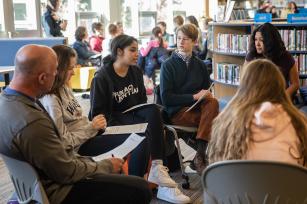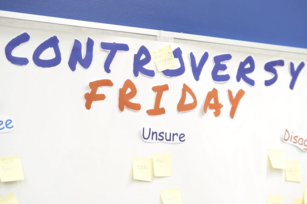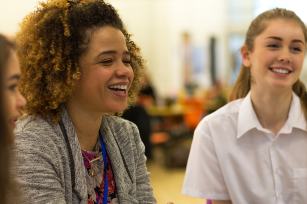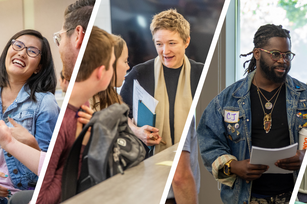
Breadcrumb
- Essential Partners
- Our Impact
- Impact Stories
- Ravenscroft Students Leverage EP Training in the Wake of a Local Shooting
Ravenscroft Students Leverage EP Training in the Wake of a Local Shooting
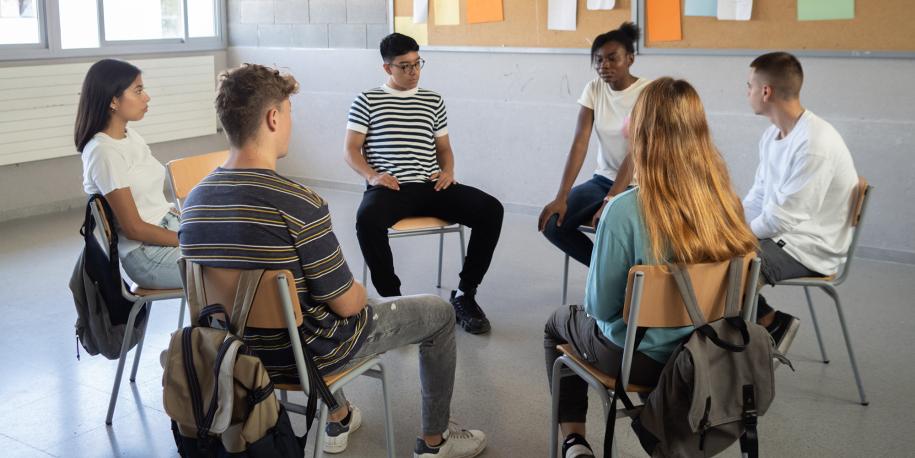
“No matter where you stand on the role of guns in our lives, everyone can agree that this is a tragedy that no one wants to happen to any community. In order for our Ravenscroft community to build a foundation of deeper awareness and more complex understanding with each other about this topic, this space is here today for students to talk with each other.”
Student Dialogue Leader
On Thursday, October 13th, 2022, a fifteen year old boy shot and killed five people, injuring two others, on the Neuse River Greenway in Raleigh, NC.
The park where the shooting took place is located 25 miles from Ravenscroft School, an independent school that has collaborated with Essential Partners since 2020. Students at Ravenscroft Upper School, trained by Essential Partners in the skills of facilitation and dialogue, wanted to have a conversation in their school community about the role of guns.
Many households in the Ravenscroft School Community contained firearms and the students knew that the issue can be highly polarizing. But they felt ready. Through training and coaching, EP had bolstered their skills. They had built the confidence to lead conversations about an issue like this, one where there are a range of views on the topic.
Ravenscroft School first reached out to Essential Partners for help having conversations around the 2020 presidential election. They were concerned about the cohesion and resilience of their community in the face of fierce partisan polarization. Since then, EP has laid a foundation for the students and educators of Ravenscroft School to hold space for hard but crucial conversations about their values, their community, and the challenges they face together.
“Deeper awareness and more complex understanding”
The day after the shooting, Ravenscroft dialogue leaders reached out to Essential Partners with goals, an outline, and a plan of action. Because they had already been trained in EP’s Reflective Structured Dialogue approach, the students and educators were able to quickly envision an intervention.
They drew from the EP Guide to Dialogues on the Role of Guns as a starting point for their program design. With guidance from Essential Partners Associate Nadiya Brock, the student leaders were able to design a custom dialogue around the issue of guns that met the specific needs of the moment and their community. They crafted a set of prompts that invited mutual understanding and deep personal reflection, such as:
- Share how the recent shooting has impacted your thinking about the issue of guns in the Triangle community. What’s important for others to understand about what is at the heart of this issue for you?
- Where are the places where you feel conflicted or have questions about this issue? What are those tensions and/or what questions do you have?
On Wednesday, October 19th, less than a week after the shooting occurred, the students convened a Reflective Structured Dialogue.
“Last week, five people in our community lost their lives when a 15 year old boy began shooting on the Neuse River Greenway Trail,” the leader began. “No matter where you stand on the role of guns in our lives, everyone can agree that this is a tragedy that no one wants to happen to any community. In order for our Ravenscroft community to build a foundation of deeper awareness and more complex understanding with each other about this topic, this space is here today for students to talk with each other.”
As ever, the purpose of the dialogue was not to persuade one another. They wanted to share their perspective with courage and listen deeply in this moment of grief, in order to better understand themselves, each other, and the larger community—so that this dialogue might make more difficult conversations and decisions possible.
The Potential of a Dialogic Culture
When Essential Partners collaborates with a school like Ravenscroft, the goal is to transform the way the community navigates their differences, especially in challenging moments. That might be a polarizing national event, such as a Presidential election, or a local tragedy, like this shooting.
Change happens when we empower the people who live, learn, work, and worship together in a community. We give people the opportunity to learn and practice the skills they need to hear and be heard, to help people feel they belong, to build relationships that can withstand the pressures of an increasingly fragmented nation.
Schools have invested in these skills can turn to them—and each other—in times of crisis.
Related Impact Stories
Testimonials

High School StudentSimply changing the wording of a question can invite a completely different personality and emotion around a question. You can learn so much more and have a better understanding of someone's perspective by changing your question.
Raleigh, NC

Lucinda Garcia, Researcher, Educator & AdvocateThe Dialogic Pedagogy Fellowship at Tufts University, in collaboration with Essential Partners, gave me transformative social-emotional learning and facilitation skills to support meaningful dialogue in the classroom. I’m excited to apply what I’ve learned to design questions that invite personal narratives, value-based discussion, and comfort with complexity—all in service of building a classroom climate where productive dialogue and engaged learning can flourish.

High School StudentThe most significant thing I've learned in this program is that having an open mindset when listening to others' opinions different from yours to understand their perspective instead of finding the flaws to oppose their opinion to try and change their mind.
Raleigh, NC

Nicki Glasser, Policy CoordinatorWhat surprised me was how much you could transform a relationship during a three-hour conversation.
Transformation Center, Massachusetts

Allyson Bachta, K-12 Educator and AdministratorEP's approach is flexible enough to support educators working across diverse contexts and parallels work that they are already doing to support students' social-emotional development, create trauma-sensitive classrooms and schools, and differentiate learning experiences to meet the needs of all learners.
Massachusetts

Meirav Solomon ’20Dialogue not only teaches you how to interact and understand more deeply those around you, it also teaches you more about the world around you and yourself. I think dialogue is super important to my growth as a student, a global citizen and a human being. I have learned to listen, I have learned to speak out, I have learned how to access my stretch zone (where I feel uncomfortable speaking but not turned off) and I have learned where my limits are.
Cary Academy, NC

Bob Bordone, Expert and AuthorEssential Partners does the best work in the field of dialogue and communication.
Harvard Negotiation & Mediation Clinical Program, Co-Founder

Linda Gryczan, MediatorInstead of demonizing and dehumanizing the other, we built a deeper connection. The fact that we disagree matters much less. It matters much more that we are neighbors in this community.
Montana Mediation Association

Meirav Solomon ’21Vulnerability is the key. A lot of perspective-taking is based in vulnerability. It’s the key ingredient in a good structured dialogue. It’s crucial to the ‘meet me in the middle’ experience that dialogue is all about.
Cary Academy, NC

Cricket Fuller, The Christian Science MonitorThis wasn’t a policy debate [about guns]. Instead, two people whose backgrounds and views diverged in almost every way possible shared a moment of honesty that struck at the heart of the matter.
Boston, Massachusetts

Becca Humphries ’21The dialogue setting created an environment where people weren’t afraid to open up and share those things that they might not always share out loud. It made us feel closer and provided a stronger sense of trust. It allowed me to be vulnerable to people outside of my community and to be open to sharing.
Cary Academy, NC

High School StudentThe thing that surprised me, was the amount of respect given to each person while speaking in the meeting. I thought that discussing politics would eventually cause problems, but it did not.
Raleigh, NC

10th Grade StudentEP's questions of understanding exercise felt like the debate that we wish the presidential candidates would have—instead of having to listen to two old guys yelling over each other.
Ravenscroft School, NC

Kimberly Shaw, EducatorStudent facilitators flip the script. When students lead, you can see a change occur, a shift as they understand the difference between being a participant and being a facilitator, as they work to hear and address the needs of their classmates and community.
North Carolina

Sophia Hopper ’24Dialogue changed how I think about the way my school runs.… now I know the people running this institution. I know their values. I know their story. There's a whole new level of trust in the institution itself.
Ravenscroft School, North Carolina

Secondary School TeacherEP's approach allows all the students in the room to speak and be heard, to think about different perspectives on the issue without getting into arguments or fights.
San Diego, CA

Vibhav Nandagiri ’21When a debate occurs, you never feel like you get to hear a person’s full point of view. But, through dialogue, you get to learn someone else’s perspective without any competitive need to win an argument. It leads to mutual understanding; listening to each other helps us chip away at our differences.
Cary Academy, NC

Kim Davidson, OmbudsI’ve gained not only confidence but tools. The Essential Partners training was worth every penny.
Oberlin College, Ohio

Teresa Grettano, Associate Professor and Director of the First-Year Writing programFacilitated dialogue creates a classroom atmosphere in which exploring uncomfortable issues and asking difficult questions is an expected part of the process, and it allows students space to engage each other without fear of the vitriol common in our public discourse.
University of Scranton (PA)

Secondary School TeacherI’m a world history teacher… now I feel I’m more empowered about how to make connections across differences. I have a better skill set to facilitate connections.
New York City

Secondary School TeacherEP's approach has given me some tools to deal with what comes up in my classroom. I teach classes about charged topics. As I’m thinking about and exploring ways to broach these conversations with students, I use this.
New Jersey

Cat Anderson, EducatorIt's incredible to really see the evolution and the change of these students, once they're given the tools—and Essential Partners has really helped me do that.
Boulevard Academy, Oklahoma

Program ParticipantThis is the best adult learning experience I have had in the past five years. I wanted to learn new skills—I did!

Andrew Wulf, PrincipalThe community dialogue was instrumental in helping us create a new policy around class rank. Though a controversial topic in the community, the dialogue EP helped us run ensured all voices were heard and valued. Regardless of how people felt with the final result, one parent summed it up best for us, ‘sometimes the process is more important than the outcome’.
Newburyport High School

High School StudentI learned that through productive dialogue, you can make relationships and friendships with people through talking about your differences and similarities.
Newburyport, MA

Program ParticipantI did not anticipate having as many concrete takeaways as I do. I feel there is an immense practical application.

Jordan Cuffee ’21The dialogue training allowed me to push myself to speak up first. In an informal conversation, I’m not usually the first person to voice my opinion; I usually end up listening, rather than taking a stance on sharing my opinion. But the dialogue training empowered us to decide if we want to say something now or listen. It really made me feel part of the conversation, rather than being on the outside, observing.
Cary Academy, NC

Belle AbayaTogether, we married our ideas to create a dialogue model that took into consideration our young people’s particular needs, and our culture.
The Conflict Resolution Group Foundation, Philippines

High School StudentI can't even begin to explain the gratitude and fulfillment I felt from participating in this Essential Partners COVID-19 dialogue. It helped me better understand myself and what I hope to accomplish throughout this period of uncertainty.

Parent, Cary AcademyEssential Partners's dialogue initiative is, literally, the best forum I have attended during my time at Cary Academy. The openness and sharing in our group led to genuine connections. I’m not sure words can express how meaningful this event was to me. Truly priceless.
Cary, North Carolina

Misty Stoll, School Board TrusteeI ran for my local school board in 2018 and was elected. I use the skills in our meetings, whether I’m chairing the meeting or not. This makes the meetings much more productive. We don’t go over the same topics over and over again.
Wyoming

Becca Humphries ’21The dialogue setting created an environment where people weren’t afraid to open up and share those things that they might not always share out loud. It made us feel closer and provided a stronger sense of trust. It allowed me to be vulnerable to people outside of my community and to be open to sharing.
Cary Academy, NC

Clay Thornton ’21Having an environment that gives you that space to listen to others talk about their experiences and understand how those experiences have led them to the opinions that they have—it is truly eye-opening.
Cary Academy, NC

Program ParticipantI felt an amazing sense of accomplishment when the Essential Partners training ended; that I'd done something important for my community and something important for me.
Massachusetts

Megan DeFranzaHere safe space was created for pastors and church leaders to wrestle with topics like evolution which are all too often “off limits” or believed to be antagonistic to the faith.
Gordon College, Massachusetts

High School StudentIt honestly surprised me that we were doing [dialogues about the 2020 election] in the first place. I have gone to this school since Kindergarten, and I have seen the recurring pattern of the faculty and staff looking to keep politics out of school discussion, which is completely understandable. Growing up this way has built a sort of stigma around politics that I feel like affected my experience in these activities. This also prompted me to learn more about how I feel about these topics.
North Carolina
